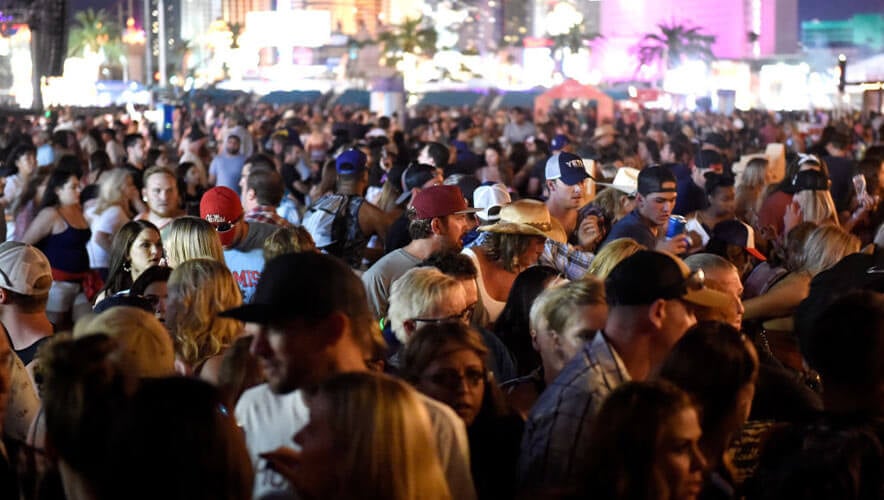Human Trafficking in Casinos: The Ghost Crime Operating in Plain Sight
As casinos, hotels, and related amenities re-open in response to the waning pandemic, criminal organizations are once again plying their trades of misery—honed and refined during the pandemic—within properties intended for entertainment and respite. Human trafficking, frequently referred to as a ghost crime, occurs in plain sight within casino and resort properties, but it remains largely unseen because the indicators of this crime are invisible to most.
Human trafficking, quite simply, is the theft of an individual’s freedom for profit. It is a modern form of slavery for forced labor or sexual exploitation. According to Truckers Against Trafficking, approximately 40 million people globally are victims of human trafficking, and human sex trafficking is the fastest-growing business of organized crime and the third-largest criminal enterprise in the world. Types of trafficking include forced prostitution, escorts and private parties, strip clubs, adult and child pornography, telephone sex lines, sweatshops, agricultural labor, domestic servitude, housekeeping, and gang-based exploitation. Criminal activity associated with human trafficking includes illicit drug sales, kidnapping, extortion, money laundering, prostitution, racketeering, and gang-related crimes.
The Polaris Project, a service organization for sex and labor trafficking victims seeking help, receives approximately 150 calls per day.
Within casino gaming establishments, the sex trafficking aspect of human trafficking is the most common form of this crime. Casino crowds and co-located lodging facilities—coupled with the transient nature of sex trafficking—provide convenience and cover for sex traffickers.
According to the U.S. Department of State, the three U.S. states with the most human trafficking activity are California, New York, and Texas. In the 2019 American Bar Association Midyear Meeting Program presentation “Trafficking in the World of Chance: Human Trafficking in the Casino Industry and Beyond,” George Jenkot, CPP, vice president of security and surveillance at the Firekeepers Casino and Hotel in Battle Creek, Michigan, described training programs and communication protocols his casino has put in place to address human trafficking.
Casino crowds and co-located lodging facilities—coupled with the transient nature of sex trafficking—provide convenience and cover for sex traffickers.
“My hope is that people develop an understanding that the issue is both huge (global) and local, there are probably trafficked people in virtually every area of the country,” Jenkot said.
Human traffickers often seek to set-up shop in casino hotels to facilitate prostitution activity. Normal casino hotel activity—with hundreds of patrons arriving and leaving the facility on a 24/7 basis and transiting from the adjacent hotel to the casino floor and back again—conceals the trafficker’s activity, and the environment provides a potential customer base for the illegal business. Indicators of a casino hotel being used for sex trafficking include:
- Paying for the room with cash or pre-paid card;
- Requesting a room or adjacent rooms overlooking a parking lot or next to a stairway far from the main entrance;
- The person checking-in arrives with very little luggage;
- Reports of excessive noise, telephones, and/or music throughout the entire day;
- Frequent requests for new linens and/or towels;
- Denial of hospitality service (“do not disturb” or “room occupied” signs);
- Occupants exhibit anxious or nervous behavior and avoid contact with staff;
- Presence of drugs in the room;
- Hotel stay extended on a day-to-day basis, or;
- Females occupying the room demonstrate no knowledge of current or previous whereabouts.
Additional indicators casino staff may observe in hotel rooms used for sex trafficking include:
- Excessive amounts of cash in the room;
- The smell of bodily fluids or musk;
- Presence of multiple computers, cellular telephones, credit card swipes, or other technology;
- The same person reserves multiple rooms;
- Individuals leaving the room infrequently, not at all, or at odd hours;
- Individuals loitering in hallways or appearing to monitor the area;
- Evidence of pornography;
- Excessive number of people staying in a room;
- Constant flow of men into rooms at all hours;
- The presence of sex paraphernalia in rooms (condoms, lubricant, lotion, etc.);
- Individuals entering and exiting the hotel or casino through side and rear entrances instead of the main lobby, or;
- Vehicles associated with rooms parked in a way that obscures license plates (i.e., backed into a parking space and no front license plate attached).
The victims of human trafficking come from all nationalities, immigration statuses, ethnic backgrounds, and education levels. Foreign nationals, people experiencing homelessness, and individuals with addictive personalities are particularly susceptible to victimization.
Various strategies—from boyfriending to abduction and relocation—are used by traffickers to enslave their victims, but one thing is certain: the strategy will be well-honed and practiced to ensure success.
The guide Human Trafficking Detection for Financial Institutions by Timea Nagy contains an overview of the various strategies used by traffickers to trap their victims. Victims are frequently courted, made to feel special, and then slowly manipulated to distance them from family, friends, and environments where they feel comfortable. Victims are placed in situations where they are made to feel that their survival is solely dependent on the trafficker. Victims are stripped of their identity, made to feel worthless, and ultimately brainwashed to trust and depend on nobody but their trafficker. Women and young girls may be locked up for weeks, drugged, terrorized, and raped repeatedly by traffickers.
Victims of human trafficking are completely controlled by their trafficker and made to believe that the authorities will jail victims for their criminal activity. By this time, the trafficker has forced their victim into a life of exploitation. Continual abuse makes it easier for traffickers to control their victims. Traumatic bonding may occur where a strong emotional attachment forms between the abused victim and his or her abuser through the trafficker’s use of perceived reward and punishment through acts of violence.
Victims become so afraid, intimidated, and dependent on their captors that they rarely speak out against the traffickers, even when presented with an opportunity to escape. Human trafficking survivor Annika Huff, reflecting on her ordeal, said, “I remember thinking there were three groups of people: the men who looked at me as if I were a product to buy, the people who looked at me like I was the trash of the earth, and the people who tried to pretend I was invisible. I had to go find the men who would want to buy me in the casino. My life was in danger if I didn’t make money for my trafficker.”
The goal of the trafficker is to control the victim by breaking their spirit and robbing them of their humanity. This is accomplished by relocating the victim, denying the victim food and sleep, and emotionally and physical brainwashing the victim. The lifestyle of a human trafficking victim may include working 18 to 20 hours a day, sleeping 4 to 5 hours a day, being allowed minimal food, not allowed to call home, not allowed to leave the residence or hotel room without a trafficker escort, not allowed to ask questions, not allowed to possess identification or money, forced to work regardless of illness, and denied medical treatment except for extreme illness that prevents the victim from generating money for the trafficker.
There are a variety of indicators across multiple categories that casino staff may observe associated with sex traffickers operating in casinos and casino lodging facilities.
Visual Indicators
- Trafficker handles the victim’s identification, travel documents, and money;
- Victim defers to another person when asked a question;
- Victim is unable to clarify where they live or their address;
- Victim is unable to state what city they are in;
- Victim has no sense of time;
- Stories provided by victims are rife with inconsistencies;
- Young girls in the company of an older “boyfriend;”
- Young women wearing dresses inappropriate for their age or inexpensive clothing and expensive-appearing jewelry and in possession of electronic devices;
- Victim avoids eye contact and interaction with others;
- Victims who appear submissive, and who exhibit fear, depression, tension, paranoia, or anxiety, or;
- Group of males or females exhibiting identical tattoos in similar locations on their bodies. This may be a sign of branding by the trafficker.
Trafficker and Victim Behavioral Indicators
- Victims waiting at a table or bar and picked up by a male (trafficker or customer);
- Traffickers interested in operations at the casino, including schedules of key security personnel;
- Individuals constantly walking the casino floor as if looking for someone;
- Victims loitering and soliciting male patrons with traffickers stationed nearby;
- Victims asking staff or patrons for food or money;
- Individuals taking cash or receipts left on tables, or;
- Persons who appear to have no freedom of movement or their movement is monitored.
Indicators of Violence
- Casino personnel may witness victims subjected to verbal threats, emotional abuse, or demeaning treatment.
- Victim shows signs of physical abuse, malnourishment, sleep deprivation, untreated injuries, or illness.
Solicitation Indicators
- Victims may be observed approaching patrons who appear to be winning big or are inebriated, and talking openly about lap dances and strip teases or using these common lines: “Lucky night?” “Do you have a cigarette?” or “Looking to party?”
- Suspected victims and traffickers may be observed making recurring and frequent trips between the casino floor and hotel rooms.
Victim Lifestyle Indicators
- Victims are forced to work 18-20 hours per day;
- Victims allowed to sleep only 4-5 hours a day;
- Victims denied food, fed leftovers or only one meal per day;
- Victim not allowed to possess money;
- Victim’s movement and interaction with casino/hotel staff restricted;
- Victim forced to work regardless of illness, or;
- Victim’s appearance frequently described as zombie-like.
Several strategies can be implemented by casino security staff to effectively deal with human trafficking activity occurring on the property. The first step is training and education of casino, hotel, and hospitality staff, as well as gaming regulators, to raise awareness and recognition of the indicators of human trafficking. Casino employees should be provided with recurrent training on indicators of human trafficking and current trends in sex trafficking.
The National Indian Gaming Commission (NIGC) is very active in raising awareness regarding human trafficking in the 524 casinos operated by 248 Native American Tribes across 29 states in the United States.
According to NIGC Chairman Sequoyah Simermeyer, “Indian gaming and its stakeholders are engaged partners in the fight against human trafficking. This engagement underscores the commitment by gaming operations and regulators to promote innovative approaches and best practices in this fight. Commitment is important if we are to help end the immoral practice of human trafficking taking place across all areas of our society. I am pleased the NIGC is demonstrating our support for this work by creating and amplifying these valuable resources.”
It is equally important to emphasize that individual action to rescue identified or suspected victims of human trafficking must be avoided. The human trafficking victim represents an investment and a lucrative source of income for the trafficker, and a casino employee interfering in the trafficker’s business places themselves at great personal risk. Law enforcement operations targeting human trafficking operations often result in the seizure of weapons, including firearms. The brainwashing a trafficking victim undergoes often requires professional intervention to undo. Untrained, well-meaning staff encouraging victims to escape will often meet with resistance and protests by the victim. The most important action casino employees can take is to remain observant and report their suspicions and observations to casino management, aided by the timely notification and intervention by law enforcement.
A casino employee interfering in the trafficker’s business places themselves at great personal risk.
Composing casino policies and procedures that outline an action plan and protocols for activation of law enforcement, trafficking victim service organizations, and specialized task forces dedicated to addressing human trafficking is the most efficient and effective strategy for addressing this form of criminal behavior. These procedures must be established well in advance of the discovery of sex trafficking occurring on casino property.
Casinos located in rural areas are not immune to human trafficking. Past instances of trafficking detected in rural casinos by trained casinos security personnel have been treated as misdemeanor contributing to the delinquency of a minor cases by local law enforcement officers not as well versed in the characteristics of human trafficking. As with any multi-agency process, coordination and collaboration of protocol development ahead of time can minimize confusion and miscommunication when suspected trafficking activity is identified and the action plan is activated.
Casino surveillance personnel should receive training in detecting patterns of behavior indicative of human trafficking and sex trafficking activity and document their observations for possible use as evidence in potential criminal prosecutions. Video surveillance of suspicious activity can be invaluable in supporting prosecution and educating casino personnel.
Casinos and hotels should consider posting signage containing human trafficking hotline numbers and contact numbers for reporting suspected human trafficking activity. Human trafficking posters and fact sheets can be obtained from the U.S. Department of Homeland Security (DHS) through the department’s Blue Campaign. Casino-sponsored community and civic events can be held to educate parents and community members about the dangers human traffickers pose to children, as well as the warning signs and red flags of human trafficking and sex trafficking.
Human traffickers will avoid bringing their illegal activities to casinos that are proactive and have a reputation of employing security personnel and casino staff trained in trafficking detection. Well-trained casino security departments and gaming commission staff put traffickers on notice that their illegal activity will not be tolerated.
The resources on human trafficking available to casinos and gaming commissions include the National Human Trafficking Resource Center (NHTRC), the National Human Trafficking Hotline, the DHS Blue Campaign, Polaris Project, U.S. Department of Justice Human Trafficking Initiatives, and local initiatives such as the San Diego District Attorney’s Office Sex Crimes and Human Trafficking Unit, San Diego Trafficking Prevention Collective, and the Southwest Michigan Human Trafficking Task Force, just to name a few.
Casinos are gathering places for entertainment and relaxation. The anguish and grief wrought by human trafficking is an affront to the safe an enjoyable environment that casino security and gaming regulators strive to create. Working together with agency stakeholders dedicated to defeating human trafficking ensures that victims receive the help they need, and casinos remain safe venues for guests and employees.
NHTRC 24/7 Toll-Free Hotline
Call the toll-free hotline number 1-888-3737-888 or text “Help” or “Info” to BeFree (233733).
Dave Vialpando MBA, CPP, CFE, CFCS, is a 37-year law enforcement veteran, having served as a police officer in Richmond, California, and as a special agent with the California Attorney General’s Department of Justice. There he worked in the Bureau of Narcotic Enforcement and as the special agent-in-charge of the Bureau of Gambling Control's southern California offices. Vialpando currently serves as the Executive Director of the Pokagon Band Gaming Commission for the Pokagon Band of Potawatomi Indians of Michigan and Indiana. He also serves as vice chairman of the board of directors of the Tribal Gaming Protection Network.










